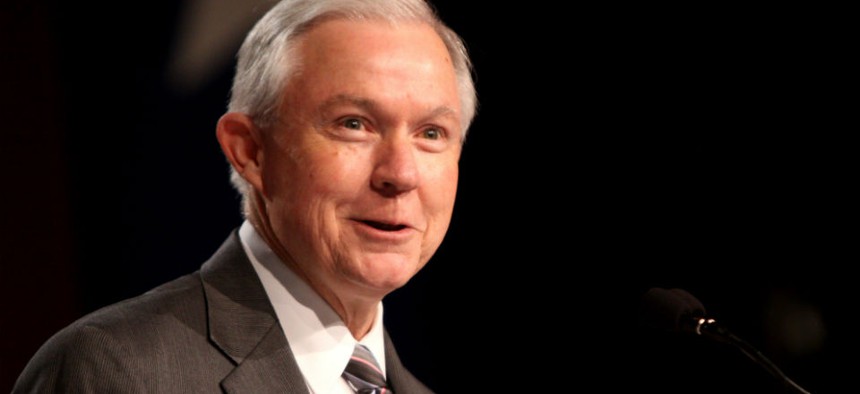
Sen. Jeff Sessions Flickr user Gage Skidmore
How Jeff Sessions Became a Leader in the Immigration Fight
Republicans have been split over how to proceed on immigration since national leaders began to call for comprehensive reform.
In recent months, Sen. Jeff Sessions has often been the loudest voice in Washington opposing President Obama's immigration policies.
In the Senate on Tuesday, his was the only Republican voice. Literally.
Five days after his colleagues scampered home for August recess, before a chamber that was empty except for presiding officer Sen. Carl Levin, Sessions delivered a half-hour speech calling on Democrats to pass the House's nearly $700 million border security supplemental as well as a bill aimed at curbing the president's power to defer deportations.
There's little chance of Senate Majority Leader Harry Reid accepting Sessions' invitation.
But Sessions' speech had as much to do with bolstering conservatives on immigration as it did with locking down a vote. Indeed, Sessions has emerged as a leader of the party's proponents of tightening the nation's immigration laws, reining in Obama's executive orders and, above, all staking out opposition to what many on the right call amnesty.
Just last week, Sessions—the top Republican on the Budget Committee—fired the procedural bullet that brought down Senate Democrats' $2.7 billion supplemental funding bill for the border security crisis. It was his budget point of order that Democrats failed to overcome in a 50-44 vote, 10 votes short.
He also appears to be serving as a an intellectual hub for conservatives, with some House GOP aides and lawmakers citing his influence last week in halting the initial bills proposed by that chamber's Republican leadership.
"Clearly Sessions was instrumental," said Mark Krikorian, executive director of the Center for Immigration Studies. "He has really stiffened backbones."
Sessions himself denies that he lobbied members, but did not rule out that he influenced the outcome and said he met with some House members, including Deputy Whip Patrick McHenry of North Carolina.
"I have worked real hard to put out good, sound information that people can rely on," he said in an interview. "And I think some of the work we produced and put out did influence—hopefully, it influenced some people; I've been told that it does."
The final House bill served to unite the fraying GOP conference, no small achievement in a Congress that has seen Republicans' internal disagreements spill into the open.
"The result was people who felt for a while that they might have been ignored felt a part of the process and it resulted, I think, in unity," Sessions said.
Republicans have been split over how to proceed on immigration since national leaders began to call for comprehensive immigration reform in their well-documented 2012 Republican National Committee autopsy, and the Senate last year passed an overhaul to the current system with GOP support.
The recent border crisis again put the issue under the national spotlight, and House Republicans were poised to succumb to internal divisions and leave town before passing anything in response to President Obama's request for $3.7 billion and the Senate Democratic bill to appropriate $2.7 billion.
Sessions saw what was happening, with the media already lambasting Republicans over their disagreement, and suggested that the House had to pass something in response.
"What I would say is, the whole House came to realize that they should not go home without having voted in opposition to the president's stated proposal to grant unlawfully 5 to 6 million people legal status and work permits. I mean, how could they ignore that?" he said.
Sessions's argument centers on the notion that White House is bordering on "lawlessness," by suggesting that it may expand legal protections to up to 6 million people.
Indeed, it's a position that many Republicans have seized on. Potential 2016 presidential candidate Ted Cruz of Texas regularly criticizes the Obama administration for overstepping its authorities and blamed the border crisis directly on the president's 2012 executive order.
But unlike Cruz, Sessions's motivations are not viewed through the lens of 2016.
"Sessions is the one actually putting out the arguments," Krikorian said. "Cruz is more Hollywood."
Alabama political strategist Brent Buchanan also pointed out that Sessions has long opposed amnesty, even working against George W. Bush's efforts at an overhaul in 2006 and 2007.
"You might fall asleep if you listen to him speak for 30 minutes, but he's also very respected," he said.
In Tuesday's speech, Sessions even suggested that federal employees tasked with carrying out executive orders disobey them. "Their duty is to say, 'No,' " he said.
The immigration issue has dogged Republicans politically, with many pundits and even some moderate lawmakers pointing out that opposing a pathway to citizenship could turn away the growing Hispanic voting bloc.
Sessions does not see an incompatibility between his position and the party's campaign goals, though.
"It absolutely is correct that the Republican Party needs to embrace … our neighbors and reach out to the Hispanic community," he said.
But whether the party supports Hispanics is not the question. Instead, the issue is whether the U.S. is a country of laws, he said.
"I think, in many ways, the mainstream media has framed this as somehow a debate over whether or not you like immigration or Hispanics when in truth the American people, their heart has been right on this from the beginning," Sessions said. "They have not been against immigration. They're not for eliminating immigration, but they are very much opposed to lawlessness and injustice in the system."
(Image via Flickr user Gage Skidmore)







